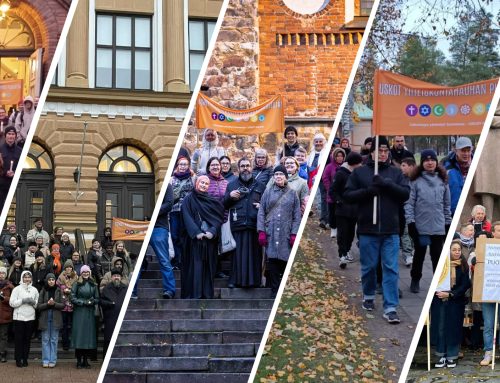Spirituality and sexual and gender identity are not mutually exclusive. Non-discrimination is essential for LGBTQ+ individuals’ freedom of religion. Thus, it is important that religious communities participate in discussions about LGBTQ+ rights and religious freedom. A seminar organized by the CORE Forum’s Human Rights Committee, aimed to foster dialogue and cooperation between religious groups and LGBTQ+ people.
Keynote speakers at the seminar included Minister of Education Anna-Maja Henriksson, Bishop of Espoo and Human Rights Delegation member Kaisamari Hintikka, Human Rights Delegation member Atik Ali, Seta’s Secretary General Kerttu Tarjamo, and Johan Bastubacka from Faculty of Theology at University of Helsinki. Hintikka, Ali, Tarjamo, Bastubacka and the vice-chair of the Human Rights Commission Ilkka Aura discussed in the panel after the speeches. The moderator of the panel was the chair of the Forum, Father Heikki Huttunen.
Human rights are indivisible
All speakers emphasized the indivisibility of human rights. Inviolability of human dignity is the first Article of the EU Charter of Fundamental Rights, and according to it human dignity must be respected and protected. Atik Ali emphasized in his speech that human dignity is in itself a basic right of all people and the basis of all other rights. The public authority has an obligation to ensure that the protection of religious freedom does not come at the expense of violating anyone’s human rights. According to Bastubacka, the Human Rights tradition is in a tense position with LGBTQ+ rights: “The UN Human Rights Convention from 1948 does not mention minority groups.” In his speech, Bastubacka stated that the interpretation of human rights has only started to consider sexual and gender minorities in recent decades. “This has opened the possibility for a more equal life.”
The seminar noted that discussions on LGBTQ+ rights within the religious sphere in Finland often focus on the Evangelical Lutheran Church’s stance on marriage. Bishop Hintikka reviewed the church’s journey toward acceptance of same-sex marriage. The theme causes internal divisions within the church. Although some clergy support same-sex marriages, and there are more and more inclusive activities and spaces for LGBTQ+ people in church, discriminatory practices persist.
The new dual model for marriage drew a lot of attention in the media and public sphere in spring 2024 in Finland. It proposes that marriage can be viewed as either between a man and a woman or between two individuals. Seminar panelists concluded that public discussion on this matter is seen as beneficial for advancing the discussion on LGBTQ+ rights within minority religions as well.
Religions are part of LGBTQ+ movement history
Religions have historically violated LGBTQ+ rights, and still today, those against LGBTQ+ people’s rights often misuse religious freedom to oppose equality. Misusing religious freedom to prevent equality violates LGBTQ+ people’s dignity and their basic and human rights. Tarjamo discussed the founding of the human rights organization Seta in response to discrimination by Evangelical Lutheran Church in 1974. First demonstration in Finland supporting LGBTQ+ people’s rights was organized in 1974 due to the church discriminating a LGBTQ+ person. That year became the founding year for Seta.
Bastubacka discussed the intertwined history of religion and politics, highlighting how religions have often allied with political power rather than advocating for LGBTQ+ rights. Questions about sexuality have been harnessed as political instrument of power.
Defending LGBTQ+ rights call for everyone’s participation
Often the discussion on LGBTQ+ rights does not take into account or include voices from the LGBTQ+ community. Hintikka emphasized that discussions on sexuality and religion should recognize that these two aspects have a significant impact on human life. LGBTQ+ individuals do exist in religious communities. Aura reminded that defending human rights is part of religions’ ethical duty. Different organizations already exist in Finland that promote LGBTQ+ rights and religious freedom.
Executive director of CORE Forum Katri Kuusikallio asked how the Forum could take action in promoting and defending LGBTQ+ rights. Panelists called for respectful dialogue and genuine inclusion of LGBTQ+ experiences in religious communities. Tarjamo reminded that the focus should go beyond the marriage question to recognizing LGBTQ+ individuals as equal members in communities without discrimination. The CORE Forum was urged to facilitate discussions and awareness, maintaining structures that support LGBTQ+ individuals and fostering safe, inclusive environments within religious communities.



